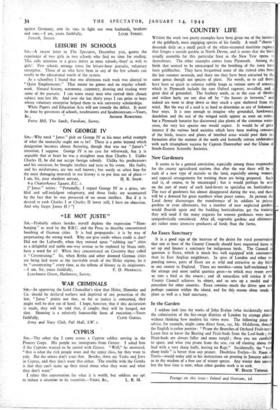COUNTRY LIFE
Wraux the week two pretty examples have been given me of the increase of the goldfinch, most taiga-ging species of his family. A small " charm " descends daily on a small patch of the white-stemmed maritime ragwort that fringes a seaside garden in North Devon, and it seems that the birds usually assemble for this particular 'feast as the New Year opens or thereabouts. The other examples comes from Plymouth. Among the birds that seemed to be encouraged by the bombing of the town have been goldfinches. They have frequented some of the ruined sites from the late summer onwards, and there too they have been attracted by the same genus though not species of plant. No weeds, so to call them, have been so quick to colonise rubble heaps as various sorts of senecio, which in Plymouth include the rare Oxford ragwort, so-called, and a great deal of groundsel. The feathery seeds,-as in the case of thistles and willow .herb, are not shut off by " the houses in between," and indeed are wont to drop down as they reach a spot sheltered from the wind. But the way of a seed is as hard to determine as any of Solomon's four ways. It is easy enough to imagine why groundsel, hawkweed, dandelion and the rest of the winged seeds appear so soon on ruins ; but a Plymouth botanist has discovered also plants of the common water- cress, the very last species one would- expect. It would be of great interest if the various local societies which have been making- censuses of the birds, insects and plants of bombed areas would pool their in- formation after the manner of the moth and butterfly census Undertaken with such triumphant success by Captain Danreuther and the Union of South-Eastern Scientific Societies.
New Gardeners It seems to be a general conviction, especially among those responsible for the county agricultural stations that after the war there will be 3 rush of a new type of recruits to the land, especially among women, and especial arrangements for training them are being prepared. Such zeal is, of course, to be encouraged ; but it would perhaps be wise on the part of many of such land-lovers to specialise on horticulture. The race of gardeners has almost disappeared during the war, and there will be a demand for great numbers when peace comes. At present the Land Army discourages the transference of its soldiers to private gardens or even allotments, but a number of now neglected gardens would flourish again and the budding horticulturists get the training they will need if the many requests for women gardeners were more sympathetically considered. After all, vegetable gardens and allotments are rather more intensive producers of foods than the farms.
An Essex Sanctuary
It is a good sign of the increase of the desire for rural preservation that one at least of the County Councils should have requested leave to set up and finance a sanctuary for indigenous birds. The Council question is Essex, which is much less well equipped` with sanctuaries than its East Anglian neighbours. In spite of London and other ex- panding towns, parts of Essex are as wild and attractive to shy birds as any county in England. There are marshes—some half-reclaimed b the strange and most useful spartina grass—to which may resort so rare a bird as the avocet ; and all naturalists will rejoice if th County Council achieves its object, and so sets up a model and precedent for other counties. Essex contains much the driest spot an perhaps sunniest within the island, and for this reason alone needs plant as well as a bird sanctuary.
In the Garden I seldom look into the works of John Evelyn (who incidentally note,: the colonisation of the fire-swept districts of London by strange plant, without thinking how modern his views were. The following piece of advice, for example, might come direct from, say, Mr. Middleton, thong the English is rather prettier : " Prune the Branches of Orchard Fruit-tree Learn first to know the Bearing and Fruit-buds from the Leaf-buds - Fruit-buds are always fuller and more turgid ; these you are carefull to spare, and what you prune from the rest, cut off slanting above t bud with a very sharp knife, leaving no Rags." Incidentally, the "ver sharp knife " is better than any pruner. Doubtless Evelyn—St. Fort in Terris—would today add to his instructions on pruning in January advice as to the wisdom of a free use of winter sprays. Any winter date serve but the best time is now, when other garden work is to seek.
a
W. BEACH THOMAS.
Postage on this issue : Inland and Overseas, ad.


























 Previous page
Previous page